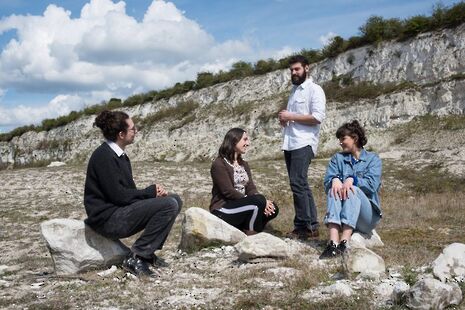Review: God of Carnage
Charlotte Taylor enjoys this humorous look at the breakdown of bourgeois values

However civilised we may pretend to be, the pleasure of watching terrible people do terrible things cannot be understated. Of course we can satisfy our need for this bear baiting sport on a very nearly daily basis, as the Jerry Springers and Jeremy Kyles of our world most charitably provide us with the opportunity for collective eye-rolling and tut-tutting at such people, without so much as moving from the comfort of our front rooms.
But the theatre has long provided us with a high octane version of this sport, in which three or four actors play smug, self-satisfied middle-class characters who are systematically stripped of their vanities, resort to savagery and collapse exhausted at the end. Yasmin Reza’s The God of Carnage takes this formula and runs with it. The result is a brutal, but delicious, dissection of bourgeois values.
In the play, two ostensibly civilised, liberal couples meet to discuss a bust-up between their sons: Alan and Annette’s son, ‘armed’ with a stick, has knocked out the two incisors of the son of their hosts, Veronica and Michael, who have invited them over for a quick tête-à-tête about how best to straighten out the incident. Coffee is made, cake is shared and everyone exclaims over art books with suitably enlightened remarks. "Fortunately," says Veronica, "there’s still such a thing as the art of co-existence, isn’t there"’ Of course, there isn’t; and it’s not long before outer garments are shed and the God of Carnage is given a free rein.
Technically speaking, it’s not much of a play on the page. It requires a decent staging and the absolute commitment of the actors to their unsympathetic, but all-too-recognisable, characters. Under Mathieu Delaveau’s direction, it gets both. The Corpus Playroom is an uncomfortably good venue for the play: the muggy weather and the size of the space combine to generate a genuine sense of oppression for the audience as well as the characters. Delaveau also makes superb use of the space. Isla Iago’s Veronica begins the play basking in her own liberal generosity, carelessly dominating the space, comfortable in the superiority of her own ideals. It is only as others take to the floor that her contrived set-up falls apart, and when Annette’s husband literally makes her spew all over Veronica’s prized Kokoschka catalogue that her true values are really exposed.
All four actors in the play are exceptional, both as an ensemble, but also as individuals forced to trade in the bourgeois veneer for viscera as the play progresses. There’s Miguel Borges’ detached lawyer, Alan, who obliviously shovels down clafoutis while on the phone arranging damage control for a corrupt pharmaceutical company; Jonathan Ben-Shaul’s Michael, the nihilistic cowardly brute, who tries to defend throwing out his daughter’s hamster onto a London street; and Evie Butcher’s nauseous Annette, who bleats ‘there is wrong on both sides’. As the certainty that their partners agree with them vanish, and the men make battle alliances with the men, and the women with the women, the shifting balance of emotions that are conveyed seem to be effortless.
The partnerships degenerate, the play links this degeneration to a larger picture of a world where only the survival of the fittest counts. "This is the unhappiest day of my life" one character states, and perhaps this play is too slight to be a meaningful indictment of world politics, as it traverses the well-known comic paths. It may be familiar, but few other productions match its comic savagery.
Due to a power cut at the Corpus Playroom on Tuesday 10th May, the opening night of God of Carnage was postponed until Wednesday 11th May.
 News / Tompkins Table 2025: Trinity widens gap on Christ’s19 August 2025
News / Tompkins Table 2025: Trinity widens gap on Christ’s19 August 2025 News / Ex-Caius student avoids ‘£20k fine’ for returning room key 40 years late23 September 2025
News / Ex-Caius student avoids ‘£20k fine’ for returning room key 40 years late23 September 2025 Features / The honesty of Cambridge vloggers 23 September 2025
Features / The honesty of Cambridge vloggers 23 September 2025 News / SU reveals Access-a-Ball rankings25 September 2025
News / SU reveals Access-a-Ball rankings25 September 2025 Film & TV / My Oxford Year is a dubious Oxford dream19 September 2025
Film & TV / My Oxford Year is a dubious Oxford dream19 September 2025









